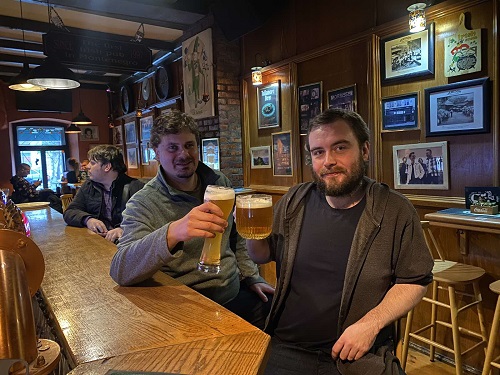
Today Irishmen from all over the world gather to celebrate St. Patrick’s Day in honor of St. Patrick, the patron saint of Ireland.
On the pages of MNE magazin we hosted two Irishmen – Nick Badot and Alex Doyle who have been staying in Podgorica for some time now. Love brought Nick to Montenegro, as he says in the interview for MNE magazin, while Alex came to visit Nick.
Love
– I'm from Ireland, I was born in the US. I'm part Belgian, but I lived in Ireland nearly all my life. I moved here to Crna Gora in August last year. My girlfriend, Jelena, is here. That's the main reason I moved. I was working in the tech industry and now I'm setting up a tech company in Crna Gora. I'm also trying to write a book at the moment and I'm using my time of rest and relaxation in Podgorica to do it – Nick presented himself with these words.
Alex had been living in Ireland all his life and he had known Nick for ,,far too long”, since early High School. He also works in the tech industry.
– I’m loving being here so far – Alex shares his impressions of Montenegro.
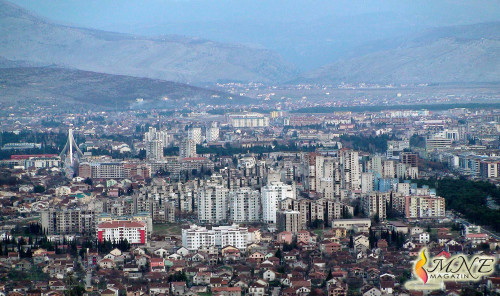
Nick, on the other side, will stay in Podgorica until Jelena finishes college. After that, they will see.
– We were actually talking yesterday about the housing market in Ireland and it's very intimidating to move back to Ireland, because our housing market is much worse than here. For example, any apartment that is going up for rent has a queue of about 50 people waiting outside to view it.
The way to get an apartment is to be the first person in that queue and then offer 500 euros more than what the apartment is being listed as – explains Nick.
Alex adds that the general cost of living is also going up a lot. Not just rent, but food as well.
– Everything. I was shocked to find out when Alex told me the other day that a chicken fillet roll, which is like a standard breakfast that you buy in a deli, now costs like €6.20 or something. I remember when we were 15, we would go to the shop beside my school and it was €3 – Nick tells us.
The price of beer, Alex explains, is also going up and now a beer costs six to 6.50 euros.
– Whereas back in the college days, I remember getting pints for three euros. Two euros at Dicey’s on Monday nights – Nick says with a laughter.
He explains that Dicey’s is a club where the Brazilian community of Ireland tends to go a lot.
– There's a lot of Irish people that end up dating Brazilians that they meet in Dicey’s. It's kind of a little cultural phenomenon there – Nick says.
Alex adds that the latest trend is that they have got a lot of Brazilians moving to Ireland.
Nick tell that in their friend group of ten close friends, four are dating Brazilians and two are dating Eastern Europeans.
– I think only one person is actually dating an Irish person – says Alex.
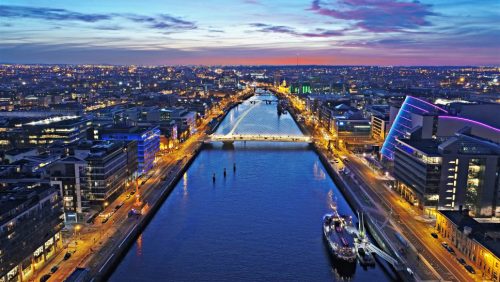
Nick likes that Dublin is multicultural.
– You get a lot of these little communities there. But for the most part, I feel like Ireland is a place that really encourages people to move there to integrate and to see themselves as Irish. IYou can be from Somalia or from Iran or from Nigeria or from America or from anywhere, but if you come to Ireland, if you learn a bit of the language, if you know a bit of the history, if you partake in Irish society, you're Irish. You're welcomed, you're accepted – Nick explains.
Alex agrees that is not about genetics, where your family is from, but embracing the culture.
Nick perfectly explains it on the example of Phil Lynott.
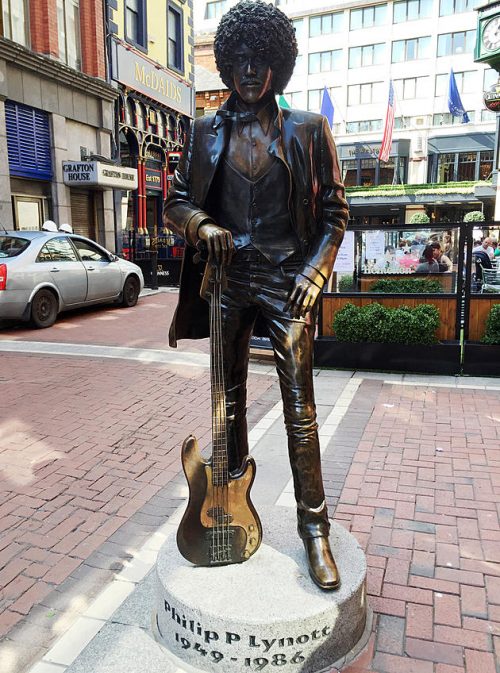
– One of the most famous and most beloved Irish people in modern history is the black Brazilian guy. Phil Lynott, do you guys know Thin Lizzy? ,,Whiskey in the Jar”, ,,Dancing in the Moonlight”. I think he is Brazilian. Anyway, he was also a black guy, an Afro. That was not controversial. Nobody ever said he wasn't Irish – says Nick.
He was embraced totally as just he is one of our best Irish people, adds Alex.
Being on music topics, we asked if it is true what we read on the Internet that whatever you do when you are a tourist and you come to Dublin or Ireland, do not mention U2.
Alex and Nick agree.
– It's strange, because I can't even really say why we don't like Bono. He's not done anything objectionable. He's not had any big controversies. He actually seems to be pretty genuine in all of his philanthropy. We have a concept. The concept is called notions – if someone is getting a bit too big for their boots or getting arrogant, rising above their station – Nick explains.
He likes ,,Bijelo dugme”, Rade Rapido and ,MonteNiggers”. He went to the concert of Željko Bebek on a New Year’s Eve in Mostar. He has also listened to Lepa Brena and Ceca.
Similarities
The conversation shifted from music to the similarities between Montenegrin and Irish people. There are a lot of them.
– What I've seen in my week here is everyone is just as friendly and hospitable as the stereotypical Irish. Very welcoming – Alex says.
Nick adds that Podgorica reminds him a lot of some small Irish towns where no matter where you go, you are going to walk down the street and you are going to see someone you know.
– You always see someone you know walking on the street. Or someone buys you a drink. I like that. I think that's probably one of the biggest similarities for sure. I'm trying to think if there's anything else. We both love potatoes. That's another one – says Nick.
They expressed their love for Montenegrin national dish called kačamak.
– Alex came to Podgorica. He was here for three hours and we took him and our other friend Brian Walsh straight to the restaurant. We asked for two portions of kačamak and the waiter was like, ,,You know that kačamak is 600 grams. You still want two portions?” ,,Yes, yes”. We finished all of it – laughs Nick.
He likes how everything is an hour drive from Podgorica and loves Kotor, Žabljak, Lake Skadar, the pelicans and the mountains.
Alex says that he likes the architecture of Podgorica.
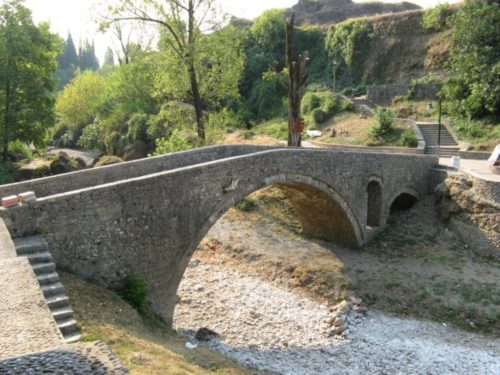
– Especially Skaline. I love history locations like that. And it seems to be a lot of that. I love the Yugoslav era apartments. There are a lot of them and people can find a place to live. We could do with some more of that back in Ireland. In Ireland, it's really difficult to build apartments. That's why most of our apartment buildings are three stories tall, because people will fight it cuz they don't want to ruin their views. You can't build a 10 story apartment block in Ireland, especially Dublin is problematic, because it's built on a swamp. We have some reclaimed land as well.I think the main thing that's built on the reclaimed land in East Wall. It is just like an industrial estate. Where I used to work, actually – Alex says.
Another similarity are electric scooters, ,,now universally hated everywhere”, Nick says laughing.
Cultural shock
The biggest cultural shock for him were casinos everywhere. He says they have bookies in Ireland.
Alex adds that people in Ireland mostly bet on horse races, as well as dog races.
They like ,,nikšićko” beer, but quite another shock for them was how cheap a two-liter bottle of beer was here.
– In Ireland we have a lot more attacks (taxes) on alcohol. We don't sell it in bottles of two liters. There it'll be for 500 ml. It's not legal to sell beer in that big of a container anymore in Ireland. Our government had to reign in our drinking. We were getting a bit too bad – Alex explains.
They like the government policy.
– I think the Irish government did really well actually not necessarily in terms of what they're doing with alcohol now, but I think like the policies that they had and the social change affected around drunk driving was really a factor. And we went from having one of the highest rates of people drunk driving in Europe to one of the lowest in a pretty short amount of time. We also had ads shown on the TV against drunk driving that were very brutal. And these were being shown to children. There would be a couple sitting on a wall and then a car with a drunk driver would turn the corner too fast in them onto the wall. It was horrific to see as a child, but it really burns it into you. I remember like four or five of those ads that were big when I was a child and I'm never gonna forget them. No. Those are burned into my brain. Yes, they're brutal and violent, but it worked. People don't drink and drive in Ireland anymore. Really. They've kind eradicated it from the culture. Okay, maybe some places in the country people still do it, but it's really the exception, not the rule – Alex and Nick say.
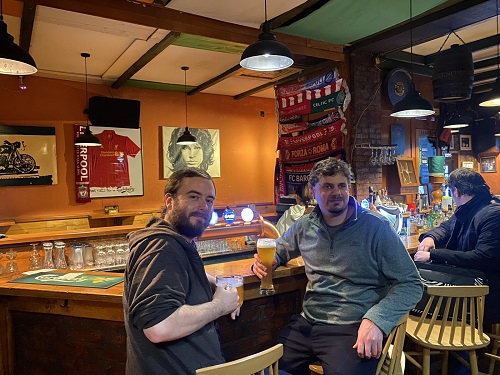
He likes rakija, homemade by Jelena’s family. They do have a Poitín, drink made of potato skin, but it is illegal to make it in Ireland.
They liked the Irish pub we were in.
– It's kind of a tradition with the Irish that wherever we go in the world, we would always find an Irish bar, because there's always one somewhere. And then we would just criticize it endlessly, because it's not Irish enough (laugh) – says Nick.
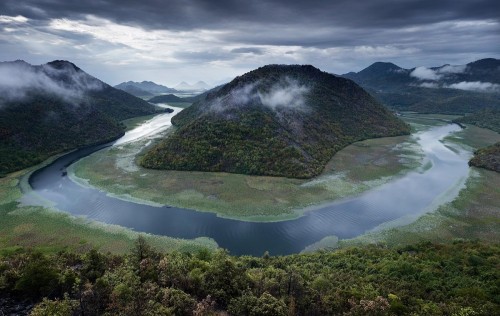
Irish language
They feel sad that only two percent of the population in Ireland speak Irish language.
– Connemara is one of the few areas in Ireland where people still speak Irish day to day. We call those areas the Gaeltacht. Sadly, a small percentage of the population (2%) are speaking Irish every day. It's sad because we care a lot about our culture and our history. But between colonialism and the British, between the Potato Famine, between immigration, you can see a map of life from the 1700 to modern day that shows the percentage of Irish speakers per a region – says Nick.
In an effort to try and keep the language alive, students in High schools can chose to go to a Gaeltacht region for a summer or to language camps where they speak Irish the entire time, Nick explains. It is a required subject in Irish schools.
– Within our school system, the language is not being taught that well, which is a real shame. When I was a teenager, I did Irish for a long time. I was actually pretty good at it. I liked the language, but because of the way it was taught, I was like, ,,Okay, I'm gonna do whatever I can to get out of doing Irish.” But now as an adult, I'm looking back on it, I really wish I'd studied it more, put more effort into it – says Nick.
A lot of Irish people are in the same position as them, where they did not like it in High school, but now that they are adults they want to know it.
Public transport
In public transport names are, they tell us, written in, both, English and Irish. Alex told an anecdote. They say, laughing, it is a famous train announcement.
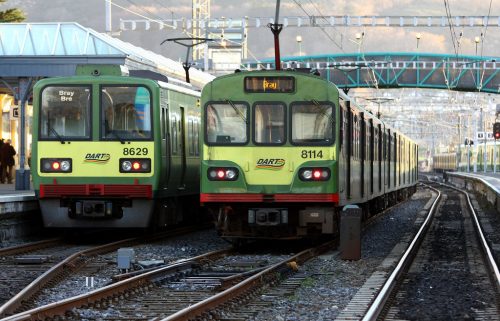
– The town I live in is called Bray. And in Irish, it's the same word, it's Bré. So anytime the train is pulling into a station, they'll say, ,,Now arriving at Dublin, Now arriving at…” When it gets down to my town, it goes, ,,Now arriving in Bra.” It just goes down really hard on the Irish show. Yes. Next station bra – Alex says, laughing.
The laughter continued when Nick told a joke about Luas, which is the name of the trams’ company in Ireland.
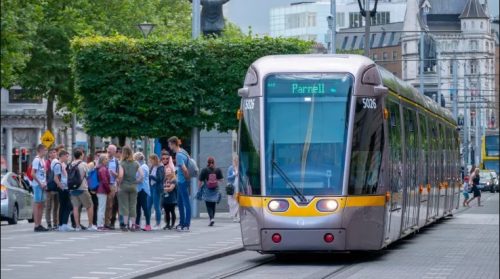
– There's a joke in Ireland – the Luas is free. It's not actually free, you're supposed to pay for it. A lot of the people don't pay for the Luas. And it's very easy to spot them because along the lines there is the occasional security guard that will come on and check tickets, but they're usually very slow at doing it. So the security guard will get on one stop and then at the next stop you just see 30 people all get off and they just wait for the next one and then come back on – Nick says, laughing.
He would like to see more public transport here.
– From what I understand, every family in Montenegro owns two or three cars, which is not so much of a thing in Ireland. Most families will have one car in Ireland. I myself, I'm 30 years old and I don't know how to drive, because I've never needed to. Any aspect of my life where I've needed to get anywhere, there's enough public transport. For me, it would be very different if I was in the west of Ireland. It's a requirement to drive there – says Alex.
B. Radonjić


